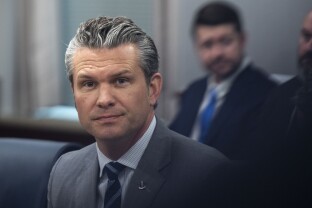Secretary of Defense Pete Hegseth sold off 23 stocks ahead of President Donald Trump’s sweeping tariff announcement and the ensuing stock market plunge in early April, new disclosure reports show.
Hegseth reported selling between $100,000 and $550,000 in stocks on March 24. Those stocks included Microsoft, Apple, Amazon, Walmart, Lowe’s and about 20 other companies — almost all of which saw stock prices plummet after Trump’s April 2 announcement.
A slew of officials and members of Congress made advantageous stock trades around the time of Trump’s announcement, as NOTUS has previously reported.
Ethics experts told NOTUS that Hegseth’s stock trades around a major political action were unlikely to have violated the STOCK Act or rise to the level of insider trading, but they still raise important questions.
“An appearance of wrongdoing, an appearance of insider trading, or the appearance that people are more focused on their stock portfolio than working on behalf of the American public is just as bad as if a violation actually occurred, because our system relies on the public being able to trust our leaders and trust in the system,” said Delaney Marsco, ethics director at Campaign Legal Center.
The Department of Defense did not respond to a list of questions from NOTUS.
The new disclosure report also shows Hegseth’s earlier stock trades. Shortly after he was confirmed as defense secretary in early February, Hegseth sold five stocks, including in companies with government defense contracts: Northrop Grumman, Lockheed Martin and Honeywell, according to the report.
Another ethics expert said Hegseth’s stock sales do not appear to take advantage of information gained from his position, but that he could have avoided concerns by selling them prior to becoming secretary.
“I don’t see anything in the stock sales or his ethics agreement that would suggest that he took advantage of information he received as a cabinet officer in executing the stock sales,” John Pelissero, director of government ethics at the Markkula Center for Applied Ethics at Santa Clara University, wrote to NOTUS via email. “To remove the appearance of an ethical issue — that he made individual stock trades while serving as SECDEF and the information that comes with that position — he could have sold those stocks before becoming a cabinet officer.”
The sold stocks were reported as assets owned by his spouse in the financial disclosure report Hegseth submitted as a nominee late last year.
Hegseth’s signed ethics agreement did not list plans to divest from any specific stocks (even though selling stocks, including those of a spouse, under Office of Government Ethics guidance, provides a tax advantage). His ethics compliance certification also responds to stock divestiture questions with “N/A.”
“That indicates that these sales were not divestitures for the sake of compliance with the ethics rules, but instead he just decided he didn’t want to own these stocks anymore,” Cynthia Brown, senior ethics counsel at Citizens for Responsibility and Ethics in Washington, told NOTUS.
“When high-level officials are engaging in stock trading, it is raising questions in the mind of the public as to, ‘What did they know in that cabinet meeting?’” she added. “Those are the concerns that come up when people who have the ability to influence policy at the highest levels, in ways that can affect the markets, are engaging in these kinds of trades during times where we know the markets are fluctuating significantly.”
The recently reported stock sales could have been both an attempt to sell off stocks to avoid the appearance of a conflict of interest and timed advantageously ahead of the “Liberation Day” tariffs and subsequent market crash, Revolving Door Project founder Jeff Hauser told NOTUS.
“You might accelerate an implementation of a strategy if you have a notion that it might be better to move sooner rather than later,” he said. “The direction may have been predetermined, the timing could have been influenced.”
—
Claire Heddles is a NOTUS reporter and an Allbritton Journalism Institute fellow.
Sign in
Log into your free account with your email. Don’t have one?
Check your email for a one-time code.
We sent a 4-digit code to . Enter the pin to confirm your account.
New code will be available in 1:00
Let’s try this again.
We encountered an error with the passcode sent to . Please reenter your email.


